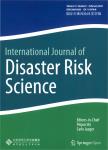Status and Social Capital:A Cross-Sectional Quantitative Investigation of Flood Survivors in South Punjab,Pakistan
Status and Social Capital: A Cross-Sectional Quantitative Investigation of Flood Survivors in South Punjab, Pakistan作者机构:Institute of Social and Cultural StudiesUniversity of the PunjabLahore 054590Pakistan Security and Resilience Studies ProgramDepartment of Political ScienceNortheastern UniversityBostonMA 02115USA
出 版 物:《International Journal of Disaster Risk Science》 (国际灾害风险科学学报(英文版))
年 卷 期:2022年第13卷第4期
页 面:549-560页
核心收录:
学科分类:03[法学] 0302[法学-政治学] 081504[工学-水利水电工程] 030206[法学-国际政治] 08[工学] 0708[理学-地球物理学] 0815[工学-水利工程] 0706[理学-大气科学]
主 题:Flood survivors Pakistan Social capital South Punjab
摘 要:A growing body of evidence underscores that social capital mitigates the impact of natural hazards such as *** we know less about the distribution of social ties in developing countries regularly hit by *** study examined the differences between demographic groups in South Punjab,Pakistan affected by the 2010 floods,comparing respondents levels of social capital measured through proxies such as received social support,perceived community cohesion,accessibility to leadership,and general level of *** carried out univariate and multivariate analyses of factors including gender,education,occupation,landholding,family size,annual income,number of livestock,and home *** data collected in face-to-face interviews with 450 flood survivors,our analysis showed no statistically significant difference in the flood victims scores on all four scales based on gender and family ***,education,occupation,landholding,annual income,and home stability statistically correlated with levels of social *** with high levels of education,high levels of land,higher home stability,and a government job typically had higher scores in all four measurements of social *** results show strong inequality in the distribution of social capital,with better connections and assistance coming to those who already have better socioeconomic positions in society.



